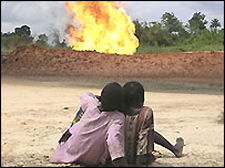Untitled Document
 |
Gas flaring dominates the
skyline in the Niger Delta |
Multinational oil companies were ordered by Nigeria's highest court
this week to stop engaging in a decades-old process that indigenous and environmental
rights groups say has been poisoning the oil-rich area where Africa's Niger
River meets the Atlantic Ocean.
"This victory marks a new dawn in the struggle of the communities of the
Niger Delta," said Reverend Nnimmo Bassey, executive director of the Nigerian
group Environmental Rights Action, soon after the Federal High Court announced
its judgment Monday against the Shell Petroleum Development Company of Nigeria.
The decision is expected to have far-reaching implications for the local activities
of ChevronTexaco, ExxonMobil, and other multinational oil giants as well.
"We expect this judgment to be respected and that for once the oil corporations
will accept the truth and bring their sinful flaring activities to a halt,"
Bassey added.
The case was brought by the indigenous Iwerekan community in Delta State, with
support from the Environmental Rights Action group affiliated with Friends of
the Earth (FoE) International, a federation of environmental campaigners that
claims 1.5 million members and supporters in 70 countries.
Justice C.V. Nwokorie ruled that the damaging and wasteful practice of flaring
by all the major companies operating in the region, which also include TotalFinaElf
and Agip, cannot lawfully continue.
Nigeria has been the world's largest gas flarer for years. It has caused more
greenhouse gas emissions than all other sources in Sub-Saharan Africa combined,
according to environmental groups.
Gas is burned off--or "flared"--when it is found in association with
oil, explains FoE. This "associated gas" is often seen as a waste
product because the company drilled for oil, not gas.
Gas flaring wastes millions of cubic feet of gas every day, costing Nigerians
at least $2.5 billion per year, according to the group, which says the World
Bank estimates flaring in Africa could produce about 50% of the current power
consumption of the entire African continent.
"This is a monstrous and unnecessary state of affairs," said the
Climate Justice Program and Environmental Rights Action in a recent study on
the Niger Delta, "especially in a country where 66 percent of people live
below the poverty line, and where the benefits of nearly half a century of oil
production have gone almost exclusively to the multinationals and the corrupt
local elite."
According to the U.S. government, Nigeria is the largest oil producer in Africa
and the 11th largest in the world. Its oil export revenue stood at more than
$20 billion per year in 2003 and was expected to rise to $27 billion in 2004.
However, despite its enormous wealth in oil and gas reserves, Nigeria remains
one of the poorest countries in the world.
"This is difficult to believe," said the authors of the study, entitled
Gas Flaring In Nigeria: a Human Rights, Environmental and Economic Monstrosity,
"until it is recalled, for example, that 28 of the 45 years since independence
have been under military rule, and that the Economic and Financial Crimes Commission
estimates 45% of Nigeria's oil revenues are reportedly wasted, stolen or siphoned
away by corrupt officials."
Routine flaring started in Niger Delta soon after the establishment of the
oil industry there a few years before the end of British colonial rule in 1960.
Environmentalists say before the court's decision, flaring by multinational
corporations in joint ventures with the state-owned Nigerian National Petroleum
Corporation had reached a world record. Their estimates suggest that in the
Niger Delta at least two billion cubic feet of gas associated with crude oil
is wasted everyday.
The waste contains a mix of toxins that pose serious health risks to the human
population. A vast majority of the Delta's residents are increasingly facing
child respiratory diseases, asthma, cancer, and premature deaths as a result
of massive flaring, researchers say.
The noise and constant light generated by the process has also been called
"intolerable" by environmental groups advocating on behalf of local
communities.
Declaring the existing law on flaring unconstitutional, Judge Nwokorie has
ordered the Attorney General of Nigeria to meet with the members of Federal
Executive Council, the nation's highest body, to bring the law in line with
the contemporary rules and regulations governing oil and gas operations.
Like Rev. Bassey, Peter Roderick, co-director of Nigeria's Climate Justice
Program, an initiative hosted by Friends of the Earth, also welcomed the court's
decision.
"This is a landmark judgment," he said. "We applaud the courage
of the judge in giving a clear message that flaring is an outdated practice
that is not acceptable in Nigeria."
Noting that it is the first time a Nigerian court has told oil companies in
the region that they have engaged in illegal activities, Rev. Bassey added,
"for the first time...children here can hope to have a dark, quiet night,
enjoy the chirps of birds, and rest their ear drums from the awful noise of
these gas flares."

